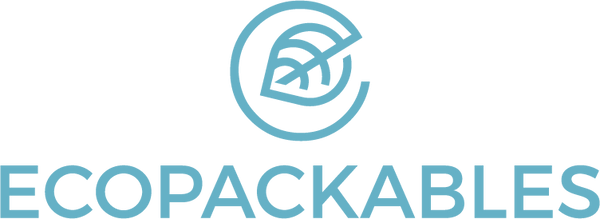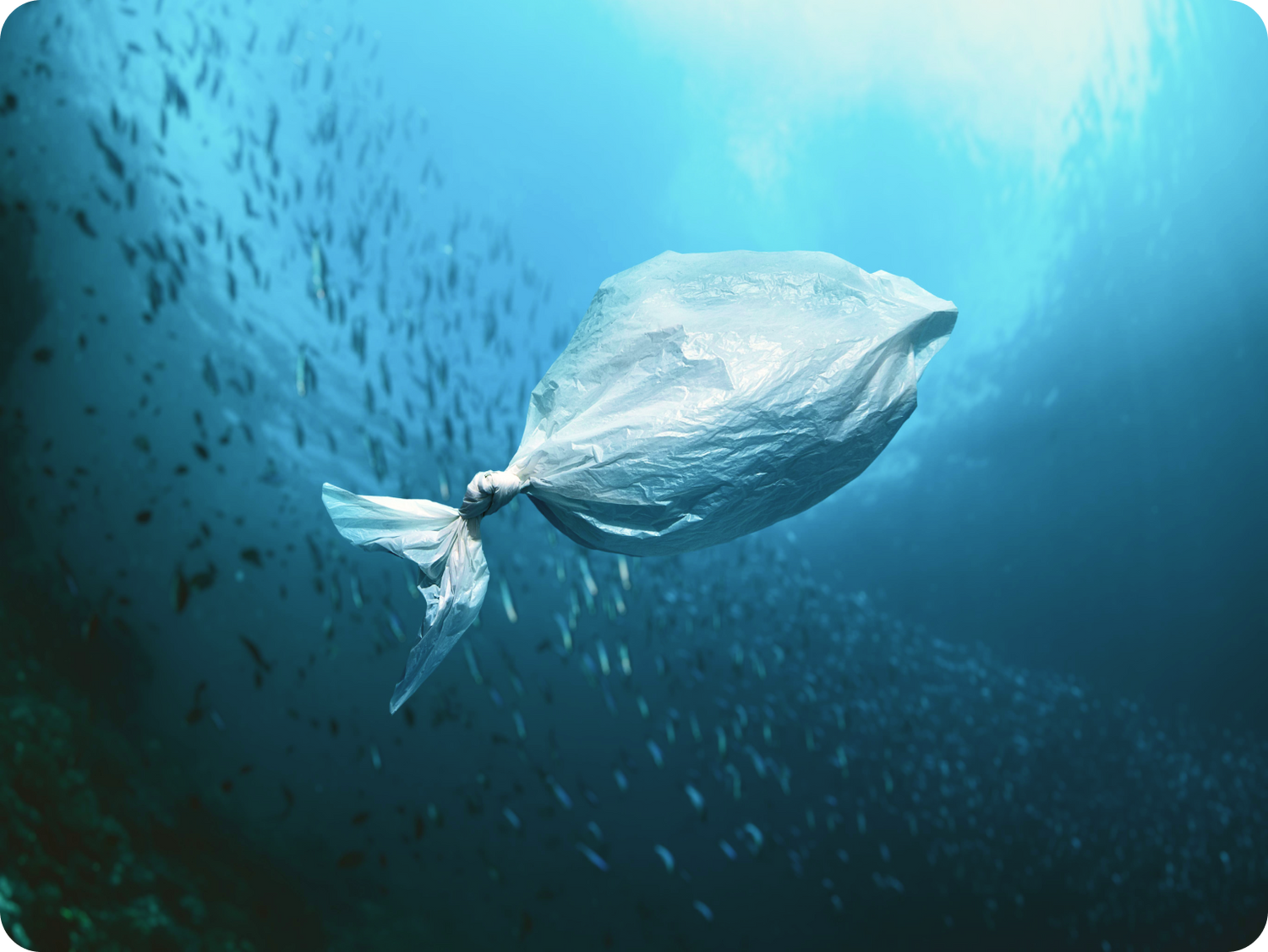
A Crisis of Packaging Waste and Pollution
Packaging has long been one of the most wasteful industries in existence, and today, there is more packaging waste than ever before. Unfortunately, only a fraction is ever recycled. Instead, the vast majority of it ends up in landfills or escapes into the natural environment as pollution.
The spread of single-use plastic packaging and harmfully-biodegradable materials wreaks havoc on wildlife and ecosystems. Even “safer” materials such as paper are often harvested from less-than-ideal sources, and can harm critical habitats and old growth forests.
To make matters worse, the packaging industry is also incredibly outdated. Because it’s often overlooked, innovation happens slowly and companies are reluctant to make significant changes in how they do packaging.
One example of this? The cardboard box has barely changed in over a century!
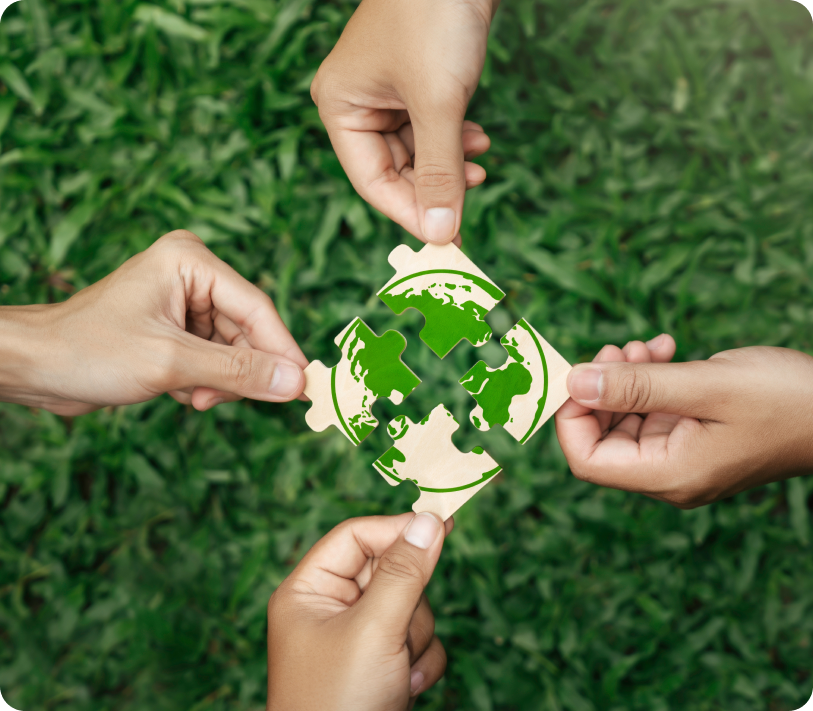
A Hopeful Future for Sustainable Packaging
These challenges are real, but they don’t mean that the future of packaging is hopeless. We believe that sustainable packaging is within reach, both now and in the future.
Our vision is a world of packaging circularity, where all packaging is either reused, composted into healthy soil, or recycled into new packaging.
We’re working toward this vision every day by pioneering the most sustainable packaging materials available.
None of these materials are a “silver bullet” that is completely without drawbacks. However, we’ve vetted each material carefully and we have the expertise to recommend the best material for every brand.
We’re here to help you find the most effective and impactful packaging strategy for your unique business, so your packaging can be a win for your brand, your customers, and the planet.
In every decision we make, we’re guided by our Six Pillars of Sustainable Packaging:

Our Six Pillars of Sustainable Packaging

Sustainable Materials Only

Make Sustainability Work for Your Business

Cultivate Your Sustainable Advantage

Prioritize Transparency, Clarity, and Trust

Invest in the Future of Packaging

Always Raise the Bar

Sustainable Materials Only
Some companies dabble in eco-friendly packaging. We specialize.
At EcoPackables, we only carry sustainable, functional packaging materials that have passed our rigorous vetting process.
We envision a world where all packaging is either reusable, recyclable, or compostable — and we’re working to bring that vision to life in real time.
A key part of this is our commitment to offering packaging made from 100% sustainable materials. Every product we offer is either recycled, recyclable, or compostable. Many of our recycled products are also recyclable, which promotes greater circularity.
We don’t claim that any material is 100% perfect. Every material has pros and cons, which we’ve carefully evaluated. Our list of materials is constantly changing as we identify new innovations that we can bring to market.
Our current packaging materials include:
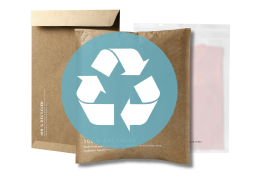
Recycled Paper
Our 100% recycled papers are FSC Certified and made from a blend of responsibly sourced recycled paper pulp and post-consumer recycled waste.
Options: Recycled Kraft, Recycled White Kraft, Recycled Corrugate, Ocea™ (virgin glassine paper)
Benefits: Recycled paper uses less water and energy and helps prevent deforestation. It’s ideal for many of the same applications as virgin paper.
Challenges: Higher carbon footprint from recycling process and transportation emissions. May not be the best fit for brands seeking to minimize carbon impact.
End-of-Life: Our recycled packaging is curbside recyclable. In most cases, it can also be composted.
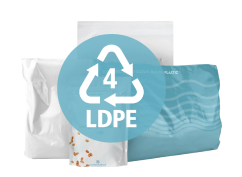
Recycled Plastic Film
Our recycled LDPE films are GRS 4.0 certified and made from either pre-consumer or post-industrial waste, or a blend of both.
Options: R100P, R100, R5050, Renewa™, P100, D39 Bubble
Benefits: Recycled plastic is versatile, water-resistant, lightweight, and can be even more cost effective than virgin plastic. It also has a relatively low carbon footprint.
Challenges: May not be the best fit for brands specifically pursuing plastic-free or plastic reduction goals.
End-of-Life: Our recycled plastic packaging is thin-film recyclable.
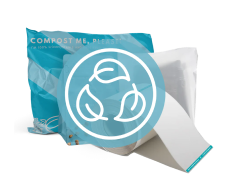
Compostable Plant-Based
Our 100% compostable films are certified for both home and industrial composting through TUV and BPI.
Benefits: These films use plant material as a base, helping reduce plastic waste and reliance on fossil fuels. They support a closed-loop system and add nutrients to soil when they break down.
Challenges: Composting infrastructure isn't currently widespread. While this is an issue, infrastructure will never improve unless we make investments into compostable materials
End-of-Life: Our compostable packaging can be composted in home or industrial settings.
We conduct extensive testing and life-cycle analyses on every material we use. Just like with any sustainability effort, packaging does not exist in a vacuum. We ensure we evaluate every new material within the broader lens of global sustainability issues and the packaging industry as a whole.
Offering all three of these unique options helps us give brands an informed, unbiased perspective on each material and identify the packaging that’s truly the best fit.

Make Sustainability Work for Your Brand
We know that in packaging, there is no “one size fits all.”
To drive meaningful change in the packaging industry, companies must adopt eco-friendly solutions that align with their unique business needs. However, for the industry to evolve, we need a variety of materials and packaging solutions that suit different brands.
Every Business Has Distinct Needs:
• Functional needs
• Operational constraints
• Aesthetic preferences
• Budget requirements
• Sustainability targets
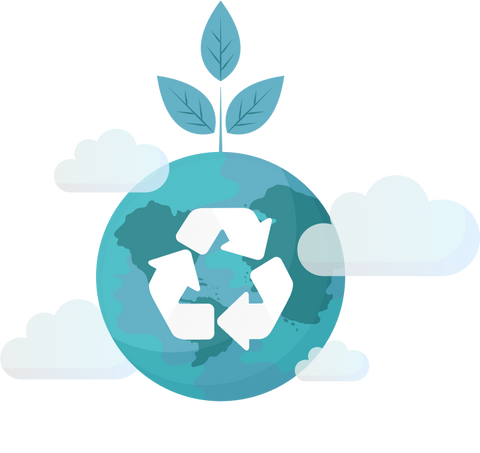

Avoiding Pitfalls in Sustainable Packaging Transitions
No two brands are exactly alike, and there isn’t a single packaging type that’s suitable for every application.
One of our top priorities is helping brands identify a sustainable packaging strategy that is effective, impactful, and makes sense for their business.
Because of this, we’re here to help brands avoid two of the most common pitfalls that pop up when transitioning to sustainable packaging:
1) Getting overwhelmed with options or complexities
2) Choosing packaging without enough information and running into problems
For example, committing to all plastic-free packaging and swapping everything out for the first available paper solution may seem like a positive at first. However, this can lead to actually increasing the brand’s carbon and environmental footprints if not done thoughtfully.
This is why we take the time to assess every factor both thoroughly and holistically for each brand we work with.
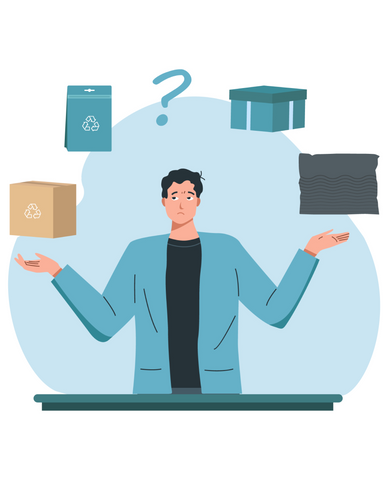
What's feasible in one situation isn't in another — and, for that matter, what's sustainable in one application is not ideal in others.
Some brands are able to go straight to looking at the top-of-the-line, luxury sustainable option, while others operate on thinner margins and need a more accessible place to start. We get it. That's why we offer a wide range of options to help brands of all profiles. Getting the ball rolling is the most important part!
We never cut corners or compromise in our quest to make sustainability accessible. Instead, we help brands find a packaging solution that helps them create a net-positive impact and paves the way for future growth.

Cultivate a Sustainability Advantage
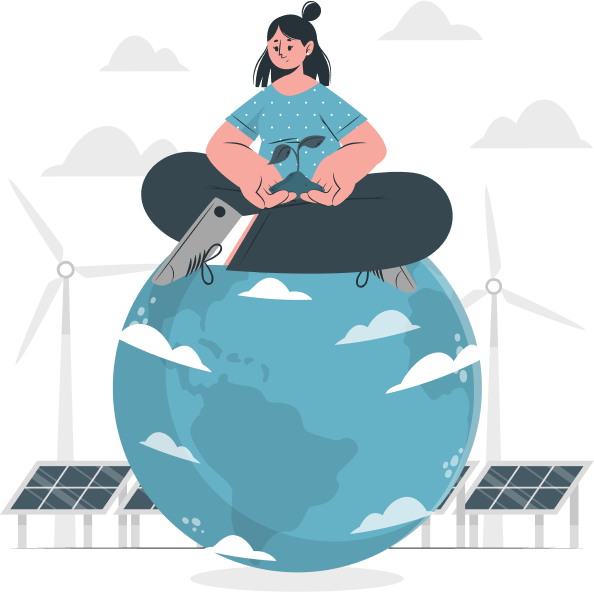
We don’t see sustainable packaging as a hindrance to your brand’s success. In reality, it can be a potent tool for building customer loyalty, strengthening your business, and standing out from the competition. And now is the perfect time to invest in sustainable packaging!
Customers are becoming increasingly aware of the impact of the products they buy — and more sensitive to greenwashing. This means that brands that have only made surface-level efforts in sustainability, or even ignored it altogether, will be at a disadvantage.
Packaging is one of the most obvious signals of a brand’s values. When sustainable packaging is executed with care, it communicates your genuine commitment to the planet. This helps you stand out to conscious consumers and solidify your positive brand image. Another way that sustainable packaging can be an advantage is by helping your brand stay ahead of the curve in compliance.
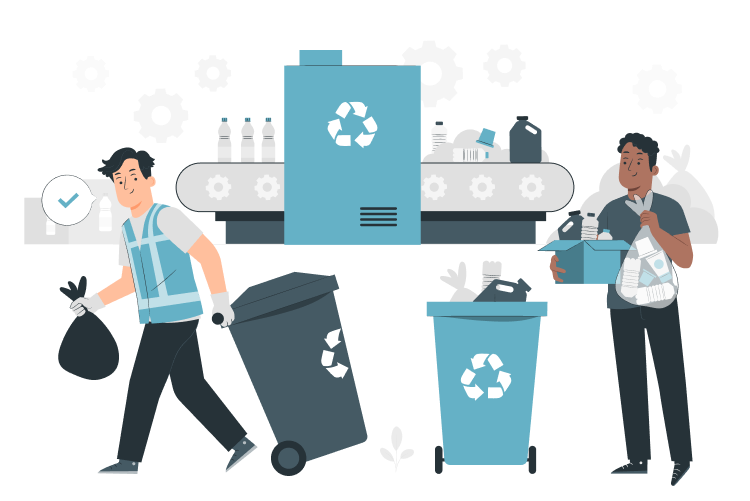
Discussions about packaging waste and sustainability are becoming more common in legislatures. Currently, five states have passed EPR (Extended Producer Responsibility) laws that require producers to take accountability for their packaging. Ten more have similar laws under consideration.
These types of guidelines and laws are only going to continue to expand. By taking steps to make your packaging more sustainable now, you’ll be able to avoid future compliance issues.
Whatever your brand’s reason for implementing sustainable packaging, we’re here to help you share your wins with customers so that your sustainability commitment can shine.

Prioritize Transparency, Clarity, and Trust
What you see is what you get — always
It’s important to us that you feel 100% peace of mind when you use our packaging materials, and that you can pass that trust onto customers.
That’s why we do the homework to ensure that all of our packaging materials meet the most stringent standards, and that every claim we make is backed up with life cycle analyses, extensive testing, and trusted certification.
Some of the certifications you’ll see on our materials include:
• Biodegradable Product Institute (BPI) Certified Compostable
• TUV Austria OK Compost Certified Compostable
• Australasion Bioplastics Association (ABA) Certified Compostable
• Global Recycling Standard (GRS) Certified Recyclable
• Forest Stewardship Council (FSC) Certified Fiber

Comprehensive Product Information and Certification Documentation
We’re also upfront about the benefits and drawbacks of every material and specific packaging type, as well as what we’re doing to continue improving. We encourage candid conversations about different packaging types and potential challenges.
In everything we do, helping brands make well-informed decisions that they feel confident about is our goal.

Invest In the Future of Packaging
There is a great need for change in the packaging industry. But this change will never happen if companies wait around for the perfect solution to suddenly appear! It’s true that no packaging currently on the market is 100% ideal. However, it’s equally true that none of the most sustainable packaging we have now would exist if brands hadn’t taken a risk on it as a “new technology” at some point.
This is why we proactively invest in the future of packaging and promote circularity. One way we do this is by bringing promising technology and materials to market, even if they’re not yet “perfect.”
For example, our compostable films contain PBAT, which is derived from petrochemicals. This represents a very small part of the film and is still necessary for structural integrity. As the demand for compostable packaging grows, the incentive for developing better products increases. By using these compostable films, we’re helping to catalyze the development of even more sustainable materials in the future.
To help promote industry-wide change, we also hope to see more brands engage in the discussion on sustainable packaging. We’re supporting this by providing high-quality resources such as articles and guides to spark productive conversations. We are here as a resource on all things packaging to help brands easily find answers to their questions.
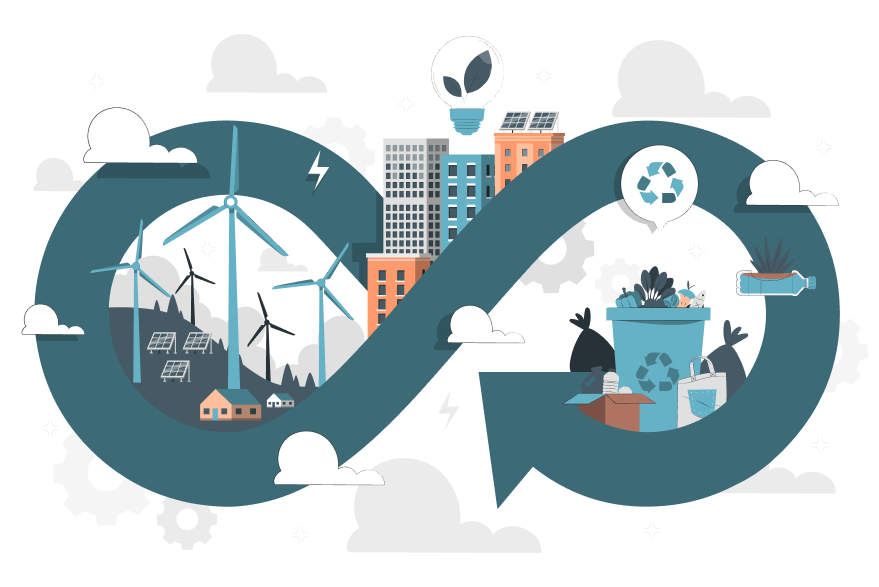
Always Raise the Bar
Every mailer matters - and so does every customer.
At EcoPackables, we’re never satisfied with “good enough.”We continually strive for the best in every aspect of our business, from our products to our ordering process and everything in between.
Our materials are the most sustainable on the market, and we’re constantly working to improve them as new technologies and capabilities emerge. Our guiding vision is a circular packaging industry, and we won’t stop until we get there.
We’re also committed to going above and beyond for our customers at every stage of the packaging journey. We know that brands face dozens of decisions and challenges every day. That’s why we make it as easy as possible to get started with sustainable packaging, and take care of everything that could become a potential headache.
Whether brands are looking to improve an existing packaging item or come up with something completely new, we’re here to make the entire experience the best that it can be.
